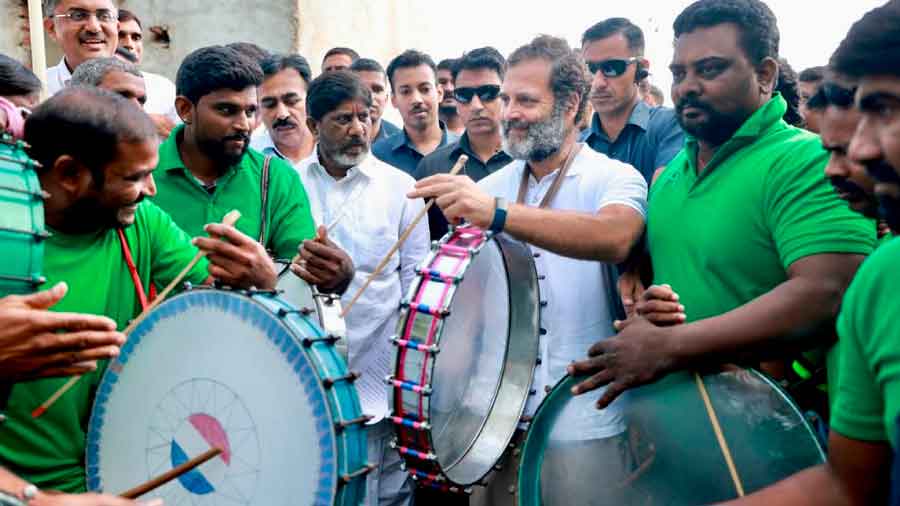The Congress on Friday accused the Election Commission of failing in its primary task of enforcing poll regulations objectively while endangering its credibility and independence by interfering in issues beyond its jurisdiction, such as the poll promises made by parties, at the government’s prodding.
Congress spokesperson Supriya Shrinate underlined that the commission had initiated its effort to vet poll promises after Prime Minister Narendra Modi disparaged the so-called freebies offered by political parties as “rewri culture”.
On October 4, the Election Commission had sought national and state parties’ views on the inclusion of a pro forma in the Model Code of Conduct for them to explain the fiscal rationale behind the promises they make in their manifestos.
“We have no problem if the custodians of democracy act independently. But it is shocking that the commission woke up soon after the Prime Minister raised the issue. Is the commission working under the government’s influence?” Shrinate said.
“Questions will be asked about their (EC’s) independence and credibility. It is also a case of misplaced priorities because the commission is looking for solutions to non-existent problems while real issues are crying for their attention.
“While what the political parties promise in their manifestos is not in its jurisdiction, the commission should have strictly enforced existing laws on communal politics, hate speech, violation of model code of conduct, level playing field, etc."
“Let the people decide what is a freebie and whether promises were fulfilled or not. If something is given to the poor for sustenance, it is called a freebie or rewri. If Rs 10 lakh crore is written off and corporate tax is lowered, it is called an incentive. The Congress promised the MGNREGA, Food Security Act, RTI, Land Acquisition Act and delivered.”
Shrinate added: “Modi promised Rs 15 lakh, houses for all and doubling of farmers’ income by 2022, air travel for the poor, two crore jobs every year, low prices, etc, and didn’t deliver. Prices of CNG-PNG are raised throughout the country but not in Gujarat. The same is the case with milk: poll-bound Gujarat is spared.
“Is that a freebie? In a democracy, the people’s will is supreme. The Election Commission cannot decide the definition of freebie and what the political parties write in their manifestos.”
The Congress has expressed similar feelings in its formal response to the commission’s query on freebies.
The reply to the poll panel from party communications chief Jairam Ramesh said: “They (freebies) are part of the dialectics of a vibrant democratic system. They are relatable to the give-and-take thrust of politics. Neither the Election Commission, nor the government, nor indeed even the courts, have jurisdiction to… regulate such issues. It would therefore be best for the commission to desist from doing so.”
Ramesh added: “Enforce existing laws first. The EC has an explicit ban on the invocation of the armed forces for campaign purposes. We moved multiple representations, highlighting the repeated and constant political references to the achievements of our armed forces in the 2019 election campaign by Prime Minister and home minister and even went to the Supreme Court to ensure that the EC heard the matters.
“Yet the EC disposed of those complaints, giving a clean chit to them, thereby, in our opinion, emboldening the continued violation of election laws that followed."
“There were multiple other violations, all of which are on record courtesy our detailed applications with annexures, such as the use of the Indian Railways, misuse of official agents, violations of the Model Code of Conduct, campaigning by Modi during prohibited hours, etc. These are the issues in our opinion the EC should be focusing on, issues which ensure that the massively irregular tilt in favour of the ruling party is corrected, or it risks becoming an entity to police solely the Opposition.”
Ramesh also brought up the difficulties of defining a poll “freebie” precisely.
“(The) EC has sought to limit campaign promises to only those that are ‘possible to be fulfilled’. Again, this is a woolly formulation. Every single party will claim that their promises are enforceable and given that the requirement proposed is to give a ‘broad formulation’ for how the promise will be achieved the threshold isn’t a difficult one to clear. Which, again, brings us back to the concern that this is a redundant exercise.”
Questioning the method of enforceability, he said: “Even assuming that the EC is available to ensure standardisation of poll promises in the format proposed, how does it ensure that these promises are met? Can it disqualify the party? Can it disqualify select candidates? Can it go to court by way of a writ to demand enforcement?
“Furthermore, the promises are contingent on the reality that exists. Can the commission demand resources be allocated to promise A when, say, a health crisis such as Covid demands that resources be diverted to other more pressing purposes? This is why the entire act is futile.”
Ramesh argued that it was disingenuous to say that parties must provide a detailed road map of how exactly the promises would be delivered.
Referring to how the Congress had fulfilled its promises, he said: “The lesson is that the realisation of poll promises is a product of political will and not a road map submitted in the manifesto. Outlandish promises come with an expiry date and are ultimately exposed by themselves (there are several examples that come to mind between 2014 to now).”










